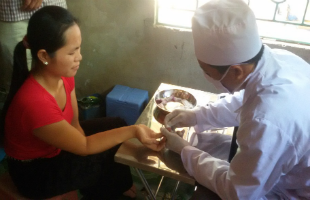Feature

Viet Nam is a pioneer in bringing HIV testing services to communities and homes. A visit to a remote and mountainous village with a large Thai ethnic minority population in Thanh Hoa Province teaches us how HIV testing in people’s home is transforming the lives of HIV infected people as well as their families.
Half an hour: That is how long it takes in the Sim village in Quang Chieu commune in Thanh Hoa province to find out if a person is HIV positive. “Within 30 minutes we can safely test and if the test is reactive, we can immediately refer the patient to confirm the results, start counselling and prepare for treatment for HIV positive people,” says Mr Luong Van Ang, head of Quang Chieu commune health station.
The simplification of testing is a huge advantage, but the real game changer is the ability to test people in the comfort of their own homes. Until recently, HIV testing and counselling in Quang Chieu commune solely took place at the commune health station. Although testing and counselling at commune level already lowers the threshold substantially, geographical and physical barriers still make it difficult for key populations to go to the commune health station.
“Speaking to relatives of HIV infected people and people who inject drugs we learned they are worried about HIV and want to receive testing and counselling to know their HIV status and protect themselves. To make this possible we needed to take HIV testing and counselling to the community, closer to people’s home. Clearing that last geographical barrier is very important to test and diagnose people early,’’ explains Dr Bui Duc Duong, Deputy Director of the Viet Nam Authority of HIV/AIDS control (VAAC).
“we needed to take HIV testing and counselling to the community, closer to people’s home"
Dr Bui Duc Duong, Deputy Director of the Viet Nam Authority of HIV/AIDS control (VAAC).
A review of Viet Nam’s HIV programme in 2014 concluded that actively supporting key populations to access HIV testing early and, if HIV positive, access Antiretroviral Therapy (ART) early would contribute significantly to reduce new HIV infection and AIDS deaths in Viet Nam.
In the house of a village health worker in Sim village a few people gathered to get tested. Some are people who inject drugs, whilst others are partners or children of people living with HIV. These villagers are reached by a village health worker and peer educator who provide information on the availability of HIV testing and counselling services and benefits of early HIV testing and early treatment. One commune health care worker also provides information and registered the villagers for testing. Another commune health worker performs the test at the other side of the house. One simple finger prick and drop blood is sufficient to conduct the rapid diagnostics test.
“The HIV testing has a great impact. A while ago, a villager felt so ill thinking he was going to die. His family had already prepared a coffin for him, but shortly afterwards he was diagnosed HIV positive and received ARV treatment. He is now feeling much better and can continue to go to work normally,” said Mr Luong Van Ang, head of Quang Chieu commune health station.
Thanh Hoa is one of four provinces (Dien Bien, Can Tho, Thai Nguyen, Thanh Hoa) in Viet Nam which implements a demonstration pilot, led by VAAC and supported by WHO, UNAIDS and other partners, to assess how early HIV testing and early HIV treatment initiation can be promoted among key populations, and whether it can be offered in acceptable ways for the clients. The findings from the demonstration pilot will feed into future policies to optimize investments to minimize HIV transmission and AIDS deaths in Viet Nam.
